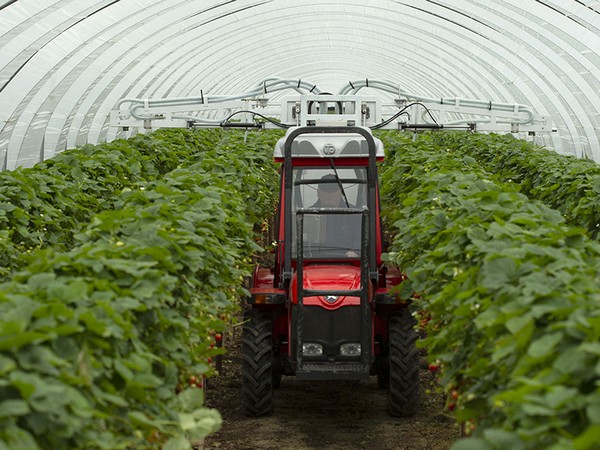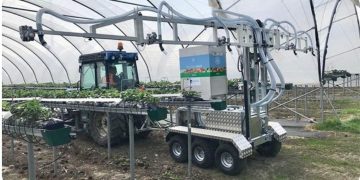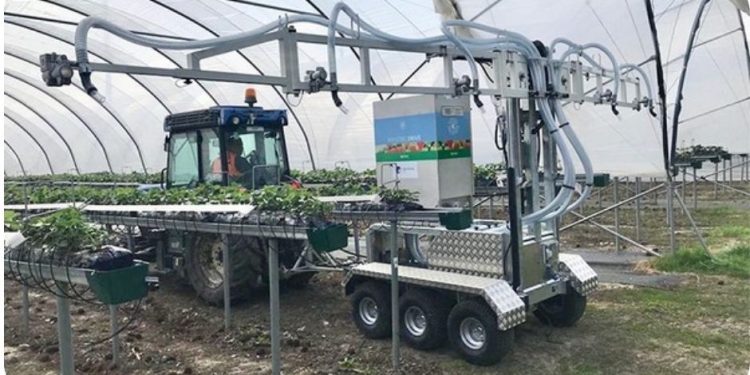Koppert’s new applicator for predatory beneficials in protected strawberry crops, Natutec Drive, has produced some excellent results in its first commercial season in the United Kingdom.
Feedback from growers shows the Natutec Drive has proved to be a cost-effective and accurate way of controlling pests, taking the use of beneficials and their efficacy to a new level.Drive’s hi-tech dispersal system, usually mounted on a tractor-drawn trailer, employs a central 60-liter rotating drum that feeds via a hopper into boom-mounted distribution tubes, transporting product via a positive airflow onto the crop.

The operator can select products and doses accurately and quickly using touch screen controls mounted on the tractor. “Our trials have repeatedly shown that predator delivery rates are consistently accurate,” Koppert technical consultant Jasper Hubert said in a news release. “And costs have also been dramatically reduced.”
A grower survey showed it took eight to nine workers an average of 47 minutes to treat 1 ha by hand, but with the Natutec Drive one person could treat the same area in 55 minutes, seven to eight times faster. “This produced an average saving of just over £40/ha per application,” Hubert said. “For a 28ha farm carrying out 11-12 applications per season, the average in the survey, this would save a total of around £9600 per year, so the machine more than pays for itself.”
The design also ensures simple filling even when mixing large quantities, keeping refills to a minimum and speeding up the application process. “We had a few electrical glitches and carried out some minor modifications to individual machines,” Hubert said. “But I don’t think we had one disappointed customer and we already have orders for new machines coming in.”
All Natutec Drives are custom built and available on lease hire from Agrovista, Koppert’s partner on fruit crops in the UK. Mark Davies, head of Agrovista fruit, said: “Over the 10 years we have been working with Koppert UK we have been focused on the quality and efficacy of biological controls.

“Our team of specialist fruit agronomists works hard to monitor crops and make appropriate recommendations, but this can be all be in vain if quality of product or application technique is poor.
“Hand application is OK to a point but relies on labour at a time in the season when other jobs, such as picking or cultural tasks, are also pressing. This has been a particular issue with the labour shortage we are facing.
“To be able to apply excellent quality, fresh Koppert beneficials with less labour, and more accurately, is a massive help to growers. Every row, and every plant, is getting an even application, and timeliness is not compromised by labour availability.”
Edward Vinson, Kent
Natutec Drive marks a major step forward in the performance of biological control agents, says John Longley, assistant farm manager at Faversham-based Edward Vinson Limited. “We have been working with Koppert and Agrovista for many years and have trialled some predecessors to the Natutec. This machine has come a long way.
“It is well built and offers a stable platform, and accuracy and consistency were soon validated by a good early establishment of beneficials.”
Biocontrol is used on about 40ha of table-top everbearers, with the Natutec currently treating 25ha of newest six-row tunnels. Thrips control begins late March with Neoseiulus cucumeris (Thripex) sachets for slow-release early prevention. When thrips activity begins, loose Thripex and Orius (Thripor-L) are applied. For spider mite, early plant inspection is key, and a blanket early application is used when temperatures rise, then it’s all about good monitoring. “One person with a tractor and the Natutec could sensibly cover 12ha on a standard day,” Longley said. “That’s 85km of strawberry bags, the equivalent of walking from Westminster to Cambridge which would take one person over 18hrs, but spreading bios on their way!
“It was difficult getting people to apply biocontrols, typically after a day of picking, and the quality and consistency of application was questionable. “The Natutec is very accurate and we are confident we can keep pests under control. “We use enough product not to pay any seasonal leasing costs and will recover the initial costs within three years in labour saving.”
WB Chambers, Kent
After a break of nearly three decades, strawberries are once again a key crop for Kent-based WB Chambers, Langley, near Maidstone.
In just four years annual output has grown from 500t to 3,200t off 61ha of polytunnels. The business runs two Natutec drives to optimise timeliness. Most plants are grown on a five-row tabletop system. “We try to keep everything uniform,” said production director Salih Hodzhov. “We have a little bit of six and four-row that we bought in. But the Natutecs can be adapted in about 15 minutes to fit the different row sizes.”
Improved timeliness has been a key benefit compared with hand application. “To get the best out of biocontrol products they need applying at the right time,” says Mr Hodzhov. “If it’s too hot, humid or windy this can affect product performance or placement. But one Natutec Drive does the work of 10 people, we can treat the whole farm over two to three days, so we can afford to wait for better conditions.”
Hand application also came at a cost. “Some people were conscientious, others less so. We ended up with thrip hotspots and probably lost 50t of crop in the first year, worth about £175,000.”
The machines cost next to nothing to run. “Koppert looks after the servicing and have been very responsive, ironing out any small teething problems,” Hodzhov said. “For any big farm it’s a no-brainer – we wouldn’t consider anything else.”
Dyson Farming, Lincolnshire
Natutec Drive has been the machine of choice for pest control at Dyson Farming since strawberry production commenced at the Carrington site this year.
It is seen as an ideal fit for the strawberry enterprise, which is developing the latest technologies and sustainable farming practices to optimise yield and quality. This year around 750t of fruit was picked in the 6ha glasshouse, mostly destined for major supermarkets. “There is a lot of development work going on and Natutec Drive is very much part of that,” said glasshouse manager Angel Angelov.
Dyson Farming’s machine has been purpose-built for the glasshouse and runs on heating rails sited between the hanging gutters. The self-propelled unit treats eight gutters at a time; the boom runs under the gutters and pipes run up and over to distribute the beneficial. It takes about 2.5 minutes to treat each 70m run and 2-3 hours per 1.5ha section, about a quarter of the time taken by hand. That saves about £1000 in labour costs for every complete glasshouse treatment. “We treat every week, rotating product, for three quarters of the life of the crop, so it quickly adds up,” Angelov said. “We tried applying some areas by hand to get a direct comparison. There were clear signs of over and under the application.
“Our experience so far suggests the Natutec is in a class of its own.”
New Forest Fruit Company, Hampshire
New Forest Fruit’s farm manager Vova Karavan is very impressed with the design and performance of the Nature Drive, enabling accurate, cost-effective application even when conditions are not perfect. The machine is used on 55ha of ever bearers grown at East Boldre, mostly on a five-row table-top system, but a sixth row can be added to treat a recently acquired field.
Karavan says the triple-axle trailer base, which is easily managed by the farm’s John Deere narrow-row tractor, provides a stable platform that reduces boom movement even on rougher ground. The boom also features variable horizontal adjustment to maintain the correct height above the crop on undulating rows and can cover 1ha/hour comfortably. The hopper is mounted inside the machine, keeping product well away from the elements when turning outside polytunnels. This, together with the air-induction system, means the machine can operate on damp days without affecting application rate.
Blowing the product onto the crop also means the machine can keep going in reasonably windy conditions. “We haven’t lost any application daysthis season,” Karavan said. “We’ve ordered a second Natutec so we can cover the area more quickly, using product that is as fresh as possible while allowing a 48-hour interval before spraying for mildew to give beneficials plenty of time to establish.”
Overall, fruit loss has been reduced to about 2-3%, compared with 10-12% using other methods. “More product is getting into the crop and it is being applied more evenly. Thrips are no longer a problem; the machine has made managing the crop a lot easier.”
For more information:
Agrovista
Rutherford House
Nottingham Science and Technology Park
University Boulevard, Nottingham, UK
enquiries@agrovista.co.uk
www.agrovista.co.uk































